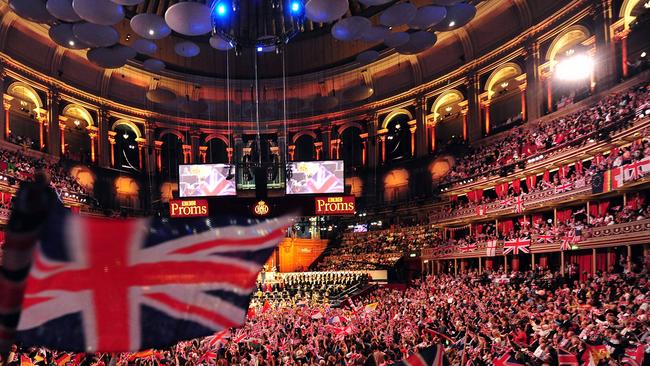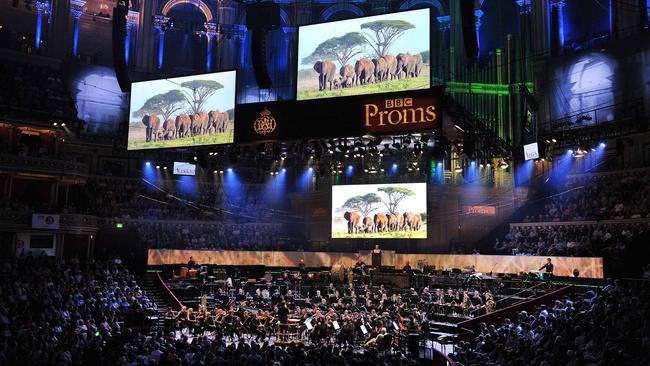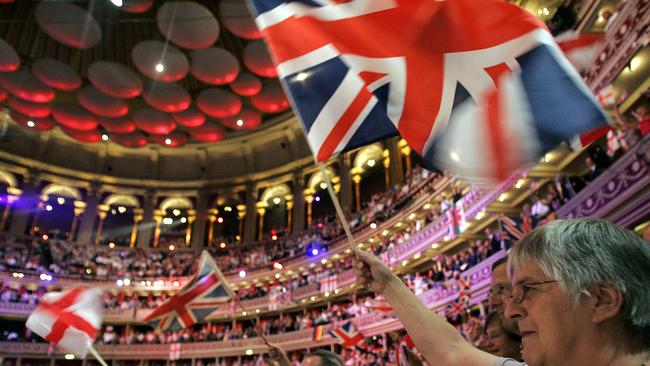
Why the decision was taken is controversial, with the BBC itself struggling to provide a coherent explanation. What is clear, however, is that Rule, Britannia has been repeatedly denounced by supporters of the Black Lives Matter movement, with Chi-chi Nwanoku — whose Chineke! Orchestra performed at the Proms in 2017 and 2019 — excoriating its lyrics as “jingoistic echoes of empire”.
At a time when the BBC is desperate to “cleanse” its programs of anything that might be called offensive — at least by those it thinks matters — the protests presumably underpinned the initial decision.
But, while Tim Davie, its new director-general, has now at least partially backed down — mandating that the lyrics, which may still be “edited”, will be sung by “a select group of singers”, rather than by the BBC chorus as a whole — the grotesque misrepresentation of Rule, Britannia highlights the cancel movement’s utter disregard for the truth.
In effect, far from being a jingoistic ode to empire, James Thomson’s lyrics were a hymn to liberty.
First performed on August 1, 1740 at Cliveden, the home of Frederick, Prince of Wales, the song was the finale of a “masque” that dramatised the reign of King Alfred.
The venue and the theme were not accidental. By 1740, Frederick had emerged as the crucial point of reference for the opposition to Sir Robert Walpole. Relying on patronage, bribes and electoral fraud to control the House of Commons, Walpole, who was well on his way to becoming Britain’s longest-serving prime minister, had created a system of rule as oligarchic and corrupt as it was unpopular.
Aggravating the administration’s unpopularity, Walpole’s attempt in 1733 to impose broad-ranging excise taxes — provoking an uproar The Historical Register called “the most material publics Event that has happen’d in our country”— earned him the loathing of Britain’s shopkeepers and yeomen farmers.

However, peculation and tax hikes were hardly the only factors that galvanised broadly based opposition. With memories fresh of Spain’s abortive invasion in 1719, Walpole’s reluctance to protect Britain’s commercial interests from Spanish incursions and his decision to rely on hired foreign troops rather than fund naval expansion were seen as exposing Britons to the risk of foreign subjugation.
Opposing those threats to Britons’ freedoms was at the heart of Thomson’s life work.
Already, several of his plays had been banned under Walpole’s Licensing Act of 1737. But because not even the Lord Chamberlain could prohibit a private performance for the Prince of Wales, Thomson, and his co-author, David Mallet, felt safe in relying on the story of King Alfred — who, they claimed, “Drove Out The Danes, Secured The Seas, Establish’d Juries, Crush’d Corruption, Guarded Liberty, And Founded The English Constitution” — to condemn a regime that promoted venality, emboldened the kingdom’s rivals and threatened to “make Britons slaves”.
Little wonder then that Rule, Britannia, whose lyrics linked the defence of longstanding freedoms, the protection of Britain’s territory and the promotion of British commerce, established itself as the anthem of all of those who despised “the deformed Vices of Tyrants”.
And little wonder too that as the era of Walpole gave way to that of the reaction against the French Revolution, and then to the repression that marked the first decades of the 19th century, the association of Thomson’s lyrics with Britain’s radical democrats — who considered it their alternative to God Save the King — became increasingly pronounced, making it Britain’s Marseillaise: a stirring call to action, rather than a solemn show of allegiance.
No doubt, the song’s subsequent fortunes varied, as did its interpretations. What never changed, however, was its role as a symbol of defiance.
Indeed, no one was as keenly aware of that as Henry Wood, the promoter and conductor who guided the Proms from their first concert, on August 10, 1895, until his death almost exactly half a century later.
Nothing, he said, meant more to him than seeing the audience as it sang Rule, Britannia, nor had anything more powerfully cemented his determination to carry on even as the Blitz destroyed the theatre in which he stood.
“When it comes to the singing of Rule, Britannia,” he wrote in his memoirs, “as I look down at that sea of faces and conduct my great, amateur, untrained choir, I know that I am British, I know that I am in my native London, and I know that in them the spirit of Horatio Nelson lives and will never die.”
An indomitable spirit, Wood was unquestionably a patriot. He was, however, no jingoist. Pressed during both World Wars to drop German composers — and especially Wagner — from the program, he adamantly refused, despite vicious, often personal, attacks.
“The greatest examples of Music and Art,” he said — echoing a statement Robert Newman, the Proms’ initial producer, had issued during the First World War — “are world possessions, unassailable even by the prejudices and passions of the hour.”
There was, in that response, a striking similarity to Wood’s close friend, Edward Elgar, whose Land of Hope and Glory was also initially stripped by the BBC of its lyrics on charges of jingoism.

Like Wood, Elgar’s patriotism — expressed in the lyrics he carefully chose for Land of Hope and Glory — never dimmed. But also like Wood, Elgar did not have a jingoist bone in his body.
On the contrary, as David Cannadine, the president of the British Academy, put it in a brilliant study of Elgar, “the composer accused of being a vulgar, chauvinistic jingo” was actually “a liberal internationalist” who was devastated by the hatred fomented by the First World War and whose last months were darkened by the fear of what Hitler, who had recently gained power in Germany, might do to the Jews, “my best and kindest friends”.
Those are the historical realities; unfortunately, they are powerless to stem the punitive hysteria of the cancel culture’s slogan-mongers, nor can they quell their efforts to expunge the last vapours of reasonableness from society’s discourse.
And yesterday’s mealy-mouthed reversal will hardly prevent our treasured legacies from being drowned in a morass of masochistic guilt that, in seeking to placate the furies of the present, demeans the past and impoverishes the future.
But Thomson, Wood and Elgar deserve better than trial by ignorance. With achievements that soar above their critics, they fully merit, once again, the uncensored pride, and the unvarnished joy, of the last night’s roar of applause.







Whatever else it may do, the BBC’s decision first to drop the lyrics of Rule, Britannia from the last night of the Proms and then, faced with public outrage, reinstate them, should lay to rest any remaining doubts about the abject ignorance that underlies today’s cancel culture.